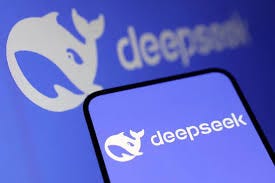Chinese AI Startup DeepSeek Sends US Stocks Into a Tumble After Unveiling Groundbreaking Technology
The sudden rise of DeepSeek and its cost-effective AI model challenges the dominance of US tech companies, triggering market chaos.
US stocks experienced a sharp decline on Monday, with chipmaker Nvidia losing nearly $600 billion in market value, following a surprising breakthrough from Chinese AI startup DeepSeek. The company unveiled a new AI model called R1, which operates similarly to popular systems like OpenAI’s ChatGPT but at a significantly lower cost. DeepSeek claimed that it only spent $5.6 million on computing power for its model, in stark contrast to the hundreds of millions or even billions that US companies typically invest in their AI technologies.
The revelation sent shockwaves through the market, particularly within the tech sector. The tech-heavy Nasdaq plummeted by 3.1%, while the broader S&P 500 dropped 1.5%. The Dow, on the other hand, saw a 0.7% rise, supported by health care and consumer companies less impacted by AI disruptions. However, the day’s losses were much more severe at the market’s opening.
Meta had recently announced plans to spend upwards of $65 billion on AI development this year. Sam Altman, CEO of OpenAI, also highlighted the trillion-dollar investments necessary to sustain the AI sector’s growth, particularly in the development of chips for electricity-hungry data centers.
Marc Andreessen, a prominent tech investor and supporter of former President Donald Trump, called DeepSeek's development "one of the most amazing and impressive breakthroughs I’ve ever seen."
The shock from DeepSeek’s low-cost achievement is amplified by the fact that the US has spent years limiting the supply of high-powered AI chips to China, citing national security concerns. DeepSeek, however, managed to create its model using lower-powered AI chips.
The effect on US tech stocks was immediate and severe. Nvidia (NVDA), the leading supplier of AI chips, saw a massive drop of nearly 17%, losing $588.8 billion in market value, the largest single-day loss ever recorded by a stock. For context, Nvidia’s losses exceeded the combined market value of all but 13 companies worldwide. The company, which was the most valuable publicly traded stock in the world earlier that day, closed in third place behind Apple and Microsoft.
Other major tech firms, including Meta (META) and Alphabet (GOOGL), also experienced significant declines. Nvidia’s competitors, such as Marvell, Broadcom, Micron, and TSMC, were similarly impacted.
The broader stock market was affected as well, with tech stocks constituting about 45% of the S&P 500. According to Keith Lerner, an analyst at Truist, the performance of US companies in AI has driven the country’s stock market dominance, and DeepSeek’s breakthrough has caused investors to question whether the US still holds its lead.
As a result, Wall Street saw a notable shift in investment strategies. Energy companies, which had benefited from the high electricity demands of AI data centers, saw their stocks plummet. Constellation Energy (CEG), which is working on a nuclear plant project to power AI centers, fell 21%. Competitors like Vistra (VST) and GE Vernova (GEV) also saw significant declines, while natural gas futures dropped 5.9%, and oil fell more than 2%.
Meanwhile, cryptocurrency markets also faced losses, with Bitcoin and other digital currencies seeing a dip.
Despite the significant market response, questions remain about the long-term impact of DeepSeek’s breakthrough. While the startup’s achievement is undoubtedly impressive, some experts believe the US still holds a commanding position in the AI race, particularly given its strong talent pool and capital resources. Giuseppe Sette, president of Reflexivity, an AI market research firm, stated that the US remains the most promising source for developing self-improving AI.
Still, the sudden rise of DeepSeek raises questions about the future of AI development and the competition between China and the US. Michael Block, a market strategist at Third Seven Capital, noted that this event could be an inflection point, with investors now closely watching how major tech companies respond.
While the R1 model may be a formidable competitor in the consumer-focused AI space, it has yet to prove its capability in more complex, industry-specific applications that currently require significant infrastructure investment. As the AI race continues, only time will tell whether DeepSeek's breakthrough represents the beginning of a seismic shift in global AI leadership.


